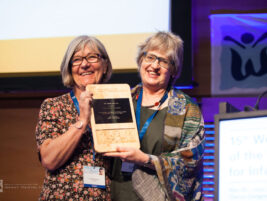Mechthild Papousek, Michael Schieche, and Harald Wurmser (Eds)
Zero-to three, Washington, DC., 2008.
Reviewed by Elizabeth Fivaz-Depeursinez
It is impossible to review in a single column the long awaited translation from german to english of the joint publication under Mechthild Papousek’s direction of the Munich’s interdisciplinary research and intervention program on early regulation disorders. I hope that an overview of its very appealing contents will speak to the Signal’s readers, be they researchers or clinicians.
This book fulfills an important need in the clinical realm in infancy, that of a truly transactional, communicational, system’s based model of intervention for what the authors aptly name behavioral and emotional regulation disorders in the first years of life: a model focused on the interaction of infant and parents in facing the regulatory tasks of early childhood; and a model addressing the dysfunctional parent-infant interactions, to which each partner contributes – not withstanding the socio-cultural context. These disorders notably comprise excessive crying, sleep and feeding disorders, failure to thrive and problems of attentional and emotional regulation.
The first section provides a theoretical perspective based on developmental pediatrics (R. Largo & C. Benz-Castellano) as well as on developmental psychopathology (F. Resch) and describes the sample of 701 infants and toddlers which were assessed and treated at the Munich program between 1994 and 1997 (H. Wurmser & M. Papousek). It closes on the central concept of the book, that of using a dynamic developmental systems approach to treat disorders of behavioral and emotional regulation in infancy. Not only is this model founded on the well-known joint research of Hanus and Mechthild Papousek, integrating insights from infancy research, but it also draws on clinical and psychodynamic concepts.
The second section provides an overview of age related clinical syndromes, summarized in four chapters by the team’s authors, from excessive crying, sleep and feeding disorders to failure to thrive, to the typical disorders of the second and third years of life – e.g. excessive clinging, social withdrawal and aggressive/oppositional behavior. Of special interest are the detailed case presentations illustrating each syndrome.
The third section describes parent- infant counseling and psychotherapy. Beginning with an overview of evidence-based treatment approaches (K. Sarimski), it proceeds with the psychodynamic aspects of sleep and feeding disorders (respectively R. Barth and T. Jacubeit), with its emphasis on Fraiberg’s “ghosts in the nursery”, and the developmental systems approach elaborated in Munich (R. Wollwerth & M. Papousek), with its emphasis on parent-infant communication as the port of entry.
The fourth section reports on early identification of long-term risks and preventive intervention. The first chapter focuses on excessive crying in the Munich’s sample, showing in particular that the majority of infants had regulatory problems in more than one domain. The findings of the 30 month follow-up point to a constellation of risk factors that may lead to internalizing and externalizing behavior problems for these children in the third year of life. These findings concur with those of the Manheim study reported by M. Laucht and co- workers in the second chapter, whereas the third chapter by M. Papousek focuses on a subgroup of infants with multiple regulatory problems, with dysphoric restlessness, problems of attention regulation and disinterest in play: The author discuses potential developmental links between this syndrome and ADHD in school age children.
What cannot be conveyed through this overview of contents is, beyond the research and clinical sophistication of the approach, the spirit of the therapeutic relationship which is the hallmark of Mechthild Papousek’s style: a profound respect for parents and infants and an trust in their intuitive resources for growth.
Authors
Fivaz-Depeursinez, Elizabeth,
Switzerland








